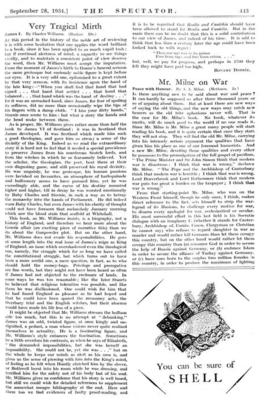Very Tragical Mirth
James I. By Charles Williams. (Barker. 10s.) AT thiS period in the history of the noble art of reviewing it is with some hesitation that one applies the word brilliant to a book, since it has been applied to so much vapid tosh ; but if continual alertness of mind, a capacity to see things vividly, and to maintain a consistent point of view deserve the word, then Mr. Williams must accept the imputation. From the moment of James's birth to Donne's funeral sermon the same grotesque but curiously noble figure is kept before our eyes. • It is a very odd one, epitomized to a great extent by that very sermon, with its insistence upon the hand of the late king :—"When you shall 'find that hand that had
signed . that hand that settled . . . that hand that balanced . . . that hand which was the hand of destiny . .
for it was an unwashed hand, since James, for fear of spoiling its softness, did no more than occasionally wipe the tips of his fingers with a damp cloth. k‘ I kiss your dirty hands," Steenie once wrote to him : but what a -story the hands and the head make between Ahem.
As is proper, Mr. Williams gives rather-more than half the book to James VI of Scotland : it was in Scotland that James developed. It was Scotland which made him such a good theologian, and gave him so strong a sense of the divinity of the King. Indeed as we read the extraordinary story it is hard not to feel That it needed a special providence to preserve James from his murderous Scotch lords, and from the witches in which he so fearsomely believed. Yet the scholar, the theologian, the poet, beat them at their own disgusting game, and still preserved -his royal divinity. He was ungainly; he was grotesque, his human passions were lavished on favourites, an atmosphere of harlequinade and, buffoonery seems to have pursued him,- yet he was exceedingly able, and the curve of his destiny mounted higher and higher, till in decay he was worsted emotionally by. Baby Charles and Steenie, in such a way as to betray the monarchy into the hands of Parliament. He did indeed warn Baby Charles, but even James with his clarity of thought could not have foreseen that melancholy January morning which saw the blood stain that scaffold at Whitehall.
This book, as Mr. Williams insists, is a biography, not a history-- of England, and therefore we hear more about the Gowrie affair (an exciting piece of narrative this) than we do about the Gunpowder plot. But on the other hand, Mr. Williams does not evade his responsibilities. He goes at some length into the real issue of James's reign- as King of England, an issue which overshadowed even the theological one, namely, the struggle which for so long we have called the constitutional struggle, but which turns out to have been a more sordid one, a mere question, in fact, as to who should hold the money-bags. Privilege and prerogative are fine words, but they might not have been heard so often if James had not objected to the enclosure of lands. In some ways he was too reasonable ; like the later Stuarts he believed that religious toleration was possible, and like them he was disillusioned. One could wish for him that he had found England as pleasant as he had hoped and that he could have been spared the recusancy acts, the Overbury trial and the English witches, but their absence would have made his life less of a piece.
It -might be objected that Mr. Williams stresses the buffoon side too much, but this is no attempt at " debunking." James was an odd, twisted figure, at once kingly and un- dignified, a pedant, a man whose visions never quite realized themselves in- actuality. He is a fascinating figure, and Mr. Williams's style enhances the fascination. Sometimes he a-little overdoes his contrasts, as when he says of Elizabeth, " She demanded impossibilities, but she was herself an impossibility. She could not be, yet she was . . ." but on the whole he keeps our minds as alert as his own is, and gives us the sense of piercing with him into the King's mind, of feeling as he felt when Huntly clutched him by the sleeve, or Bothwell burst into his room while he was dressing, and terrified him for the safety not of his body but of his soul. Mr. Williams. gives us confidence that his story is well based, but still we could wish for detailed references to supplement the somewhat meagre bibliography at the end. Here and there too we find evidences of faulty proof-reading, and it is to be regretted that Reulis and Cautehis should have been allowed to stand for Reodis and Cautel-is. But in the main there can be no doubt that this is a solid contribution to our view of James, and indeed of his time. It is odd to
think that less than a century later the age could have been looked back to with regret : "Then our age was in its prime
Free from rev, and free from crime, . . ."
but, well, we pay for progress, and perhaps in 1700 they felt they might have paid too high.
BONAMY DOBREE.


















































 Previous page
Previous page